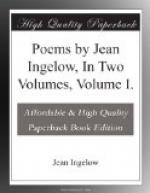(He speaks.)
I am a fool, with sudden start he cried,
To let the song-bird work me such unrest:
If I break off again, I pray you chide,
For morning neeteth, with my tale at best
Half told. That white stone, Madam, gleamed beside
The little rivulet, and all men pressed
To read the lost one’s story traced thereon,
The golden legend—“While she lived
she shone.”
And, Madam, when the Poet heard them read,
And children spell the letters softly
through,
It may be that he felt at heart some need,
Some craving to be thus remembered too;
It may be that he wondered if indeed
He must die wholly when he passed from
view;
It may be, wished when death his eyes made dim,
That some kind hand would raise such stone for him.
But shortly, as there comes to most of us,
There came to him the need to quit his
home:
To tell you why were simply hazardous.
What said I, Madam?—men were
made to roam
My meaning is. It hath been always thus:
They are athirst for mountains and sea-foam;
Heirs of this world, what wonder if perchance
They long to see their grand inheritance?
He left his city, and went forth to teach
Mankind, his peers, the hidden harmony
That underlies God’s discords, and to reach
And touch the master-string that like
a sigh
Thrills in their souls, as if it would beseech
Some hand to sound it, and to satisfy
Its yearning for expression: but no word
Till poet touch it hath to make its music heard.
(He thinks.)
I know that God is good, though evil dwells
Among us, and doth all things holiest
share;
That there is joy in heaven, while yet our knells
Sound for the souls which He has summoned
there:
That painful love unsatisfied hath spells
Earned by its smart to soothe its fellows
care:
But yet this atom cannot in the whole
Forget itself—it aches a separate soul.
(He speaks.)
But, Madam, to my Poet I return.
With his sweet cadences of woven words
He made their rude untutored hearts to burn
And melt like gold refined. No brooding
birds
Sing better of the love that doth sojourn
Hid in the nest of home, which softly
girds
The beating heart of life; and, strait though it be,
Is straitness better than wide liberty.
He taught them, and they learned, but not the less
Remained unconscious whence that lore
they drew,
But dreamed that of their native nobleness
Some lofty thoughts, that he had planted,
grew;
His glorious maxims in a lowly dress
Like seed sown broadcast sprung in all
men’s view.
The sower, passing onward, was not known,
And all men reaped the harvest as their own.
It may be, Madam, that those ballads sweet,
Whose rhythmic words we sang but yesterday,
Which time and changes make not obsolete,
But (as a river blossoms bears away
That on it drop) take with them while they fleet—
It may be his they are, from him bear
sway:
But who can tell, since work surviveth fame?—
The rhyme is left, but lost the Poet’s name.




